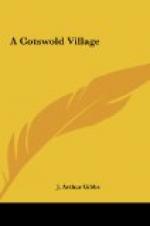And not the least of the advantages of cricket is the large number of friends made on the tented field. For this reason the jolliest cricket is undoubtedly that which is played by the various wandering clubs. Whether you are fighting under the banner of the brotherhood whose motto is “United though untied,” [6] or under the flag of the “Red, Black, and Gold,” [7] or with any other of the many excellent clubs that abound nowadays, you will have an enjoyable game, whether you make fifty runs or a duck’s egg.
[Footnote 6: The Free Foresters.]
[Footnote 7: The I Zingari.]
County cricket is nowadays a little over done. Two three-day matches a week throughout the summer don’t leave much time for other pursuits. A liberal education at a good public school and university seems to be thrown away if it is to be followed by five or six days a week at cricket all through the summer year after year. Most of our best amateurs realise this, and, knowing that if they go in for county cricket at all they must play regularly, they give it up, and are content to take a back seat. They do wisely, for let us always remember that cricket is a game and not a business.
On the other hand, much good results from the presence in county cricket of a leavening of gentle; for they prevent the further development of professionalism. It is doubtless owing to the “piping times of peace” England has enjoyed during the past fifty years that cricket has developed to such an abnormal extent. The British public are essentially hero worshippers, and especially do they worship men who show manliness and pluck; and those feelings of respect and admiration that it is to be hoped in more stirring times would be reserved for a Nelson or a Wellington have been recently lavished on our Graces, our Stoddarts, our Ranjitsinhjis, and our Steels.
As long as war is absent, and we “live at home at ease,” so long will our sports and pastimes flourish and increase. And long may they flourish, more especially those in which the quality of courage is essential for success! It will be a bad day for England when success in our sports and pastimes no longer depends on the exercise of pluck and manliness; when hunting gives place to bicycling, and cricket to golf; when, in fact, the wholesome element of danger is removed from our recreation and pursuits. Should, in the near future, the long-talked-of invasion of this country by a combination of European powers become an accomplished fact, Englishmen may perchance be glad, as the cannon balls and musket shots are whizzing round their heads, that on the mimic battlefields of cricket, football, polo, and fox-hunting they learnt two of the most useful lessons of life—coolness and courage.
[Illustration: Hawking 267.png]
CHAPTER XII.
THE COTSWOLDS THREE HUNDRED YEARS AGO.
Nowadays, thanks in a great measure to Mr. Madden’s book, the “Diary of Master William Silence,” it is beginning to dawn on us that the Cotswolds are more or less connected with the great poet of Stratford-on-Avon.




